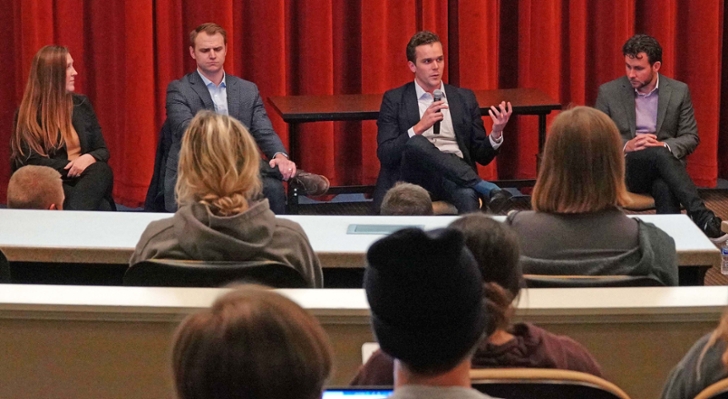Panelists: Spotlight on supply chain means plenty of opportunities


One could argue that until the last year or so, something that consumers didn’t think a lot about was the process by which something they wanted got from where it was made to the consumers’ front door.
That’s not the case anymore.
“Supply chain is definitely the popular kid right now. If you look in the papers, we are having a moment. I think there's a lot more recognition, as we come out of this pandemic, of how important supply chain is to a company,” Mammotome senior director of procurement Kelly Huffsteder said. “I think supply chain will continue to be a more respected, important seat at the table as we go on.”
And if something is important, a lot of work is needed to keep it going smoothly. That idea brought Farmer School students to a Center for Supply Chain Excellence event to listen as Huffsteder and other supply chain executives talked about careers in the supply chain field.
“I would encourage everybody to take a look at the types of roles that you can pursue, if you're on the fence about supply chain,” AlixPartners VP of enterprise improvement Andrew Wills said. “If you’re interested in a specific industry, take a moment to understand what supply chain roles look like in that specific industry. And I guarantee you, there is something that leverages a core supply chain discipline that would be looking for people like you.”
“You are afforded the opportunity in supply chain to work on things that really matter, be it a chip shortage, or be it a ship that's wedged sideways in a canal,” West Monroe Partners director of mergers and acquisitions Connor Kohlenberg said. “That's what you're dealing with every day. And you have to enjoy that. You have to enjoy talking about what's on the cover of the Wall Street Journal and how it's impacting your life, how you're putting out fires as an outcome of it all.”
The panelists said a good supply chain job candidate will have skills and knowledge that go beyond what is taught in supply chain classes.
“You get exposure to finance, you get exposure to accounting, you get exposure to engineering and operations. You are touching base with every other function in the business. Everybody's very interested in when materials are coming in or when they can launch their new products or how much money you're saving the company. All of these different functions are relying on supply chain,” Huffsteder said.
“Having an understanding of financial skills should not be limited to the finance major. One of the things that will really separate yourself from other business professionals is if you can confidently speak the language of finance, you can understand how to create value and specifically how your fund creates value and understanding the levers of value creation. You’ve got to get very intimate with the profits and losses, with the balance sheet, with the cashflow statement,” Wencor Group director of product management Brent Curtis said. “That's something that not everybody does. They’ll say, ‘Hey, that's something for finance,’ but no, that's not the case. If you're in a corporation and you have that skillset, you'll really stand out in a positive way.”
The panelists noted that a degree in supply chain gives students options, both within the field and outside it. “The way I viewed my supply chain degree was it was a foundation of building blocks and Legos that let me build where I wanted to go,” Kohlenberg said.
“What’s great about this field is you have the opportunity to be an expert and gain fulfillment in purchasing or inventory or quality or whatever it may be. But for those who want that breadth of experience, you also get the opportunity to exercise that diversity of thought and role in a career,” Curtis said.
The panelists, all Miami University graduates, agreed that the students are in the right place to get the skills, experience, and relationships they need to move forward after graduation.
“The caliber of students that come out of this university, and specifically the business school, is far beyond Notre Dame, Michigan, and others – though I am biased,” Kohlenberg said. “I think you all really need to take a step back and understand events like this, other executive speaker series, all the business fraternities, etc, offers you so much real-world experience through case studies and such, and how that sets you apart in the job field. I think that the program that's been created here around supply chain is really set apart from a lot of others.”
“You've got a ton of really qualified, great professors with a lot of experience. And I know me personally, there's a few professors I keep in touch with on an annual or bi-annual basis, seeking their advice when big moves come up,” he said.
“As you go into your career, you'll notice the investment paying off. You'll notice the caliber of people you have around here, and you'll go into different companies and you'll say, ‘Wow, I was around some pretty talented people,’ especially if you're serious and intentional around what you're involved in here on campus,” Curtis said. “Miami has representation at the best companies, the most difficult industries to get into, leading some of the largest companies in the world. You should come out of this school with a great deal of confidence in the level of preparation you have. This whole ‘Beyond Ready’ idea? It's really true.”

